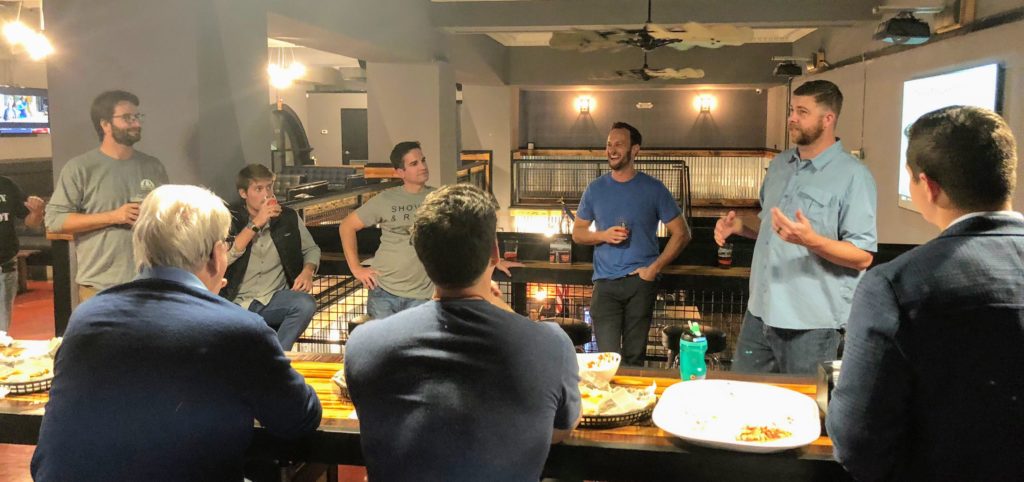One by one men amble up. Many run late. Not even close to a hundred of us. It’s not clear this is actually the official group and not just a bunch of random dudes chatting, comparing the craft beers on tap at Pour.
At this high-tech, self-service taproom in the Murchison building downtown, whose owner Brian Ballard donated the event space and the appetizers for this evening, there are dozens of taps, walls of them on two floors, each with its own little screen full of information. To get a beer, you choose, wave your rubber wristband near the screen, and pour. The space is crowded and comfortable. It’s social. Ironically, the automation gets people clumping together around the taps or the couches, striking up conversations.
The group of men does seem a bit random. That’s part of what seems so winning about the 100 Men Who Care organization starting up in Wilmington. We are just a bunch of dudes. Different kinds, different walks. At this inaugural November meeting, we are told, we are forming the only chapter of 100 Men Who Care in North Carolina at present, which feels pretty good. Take that RTP! There have been others in the state at different times—and there are hundreds of similar organizations across the country: There are 100 Black Men Who Care organizations. 100 Women Who Care is a common configuration—there’s a very successful one of these in Charlotte. There’s rumors of a 100 Children Who Care. Though all share a common mission, these organizations are different, separate, and evolving. Organizations like 100 Men Who Care are not legal entities, or tax shelters. They’re more like networks–networks of members who are interested in outcomes, collaboration, camaraderie, and the success of the region as a whole. These members bring this same sensibility to their professions, to their hiring, to their other organizations and community service.
Aaron Rovner, one of the organizers of this Wilmington chapter, says the idea was so compelling that he and his partners got the plan off the ground in minutes, got the website going a little bit later than that. When you hear about it, it just sort of makes sense, and this makes it work well—especially for people who want to contribute but want the support of a structure, who are busy, who want a way to vet their giving. It’s all not quite finished, and not quite official, not written into bylaws, not centrally managed. Instead, it’s agile, and it may be just the sort of lean, light, social structure that can channel giving the best. And be a boon for the area.
The way it works is this: Every quarter, members of 100MWC gather in places like Pour. Three members present their candidate charities to the others, describing the organization, the particular need. They answer questions. The emphasis here is not on selling the charities but on plain talk, real needs, and consensus. Once the discussion winds up and the votes have been tallied, all the members cut 100 dollar checks to the winner. That’s it. It can amount to as much as 10,000 dollars to the selected recipient (100 men x 100 dollars), and it happens every quarter.
This last meeting the three candidates were:
- Cape Fear Volunteer Center (CFVC),
- Eastern Carolina Food Bank and
- Wilmington Area Rebuilding Ministry (WARM)
CFVC won handily with 40% of the votes, and is using our money to buy a box truck for shuttling volunteers and building materials to different sites affected by the hurricane. With so much need and so many pitching in to help for Florence, we voted for something infrastructural, a charity that makes other charities work better. The group raised about 2500 dollars that night (We were about twenty five Men Who Cared), and a member who couldn’t make it that night, Ross Hamilton from Connected Investors, rounded the total up to 5000 dollars!
Possibly winter Nor’easters and damaging freezes will be the focus of the next quarterly meeting in February. But there’s always need, and if you’re like me you want to figure out how to help wisely, and in the company of others who feel the same and can help make sense of it. 100MWC Wilmington is perfect for this.
As I got more into it over the course of the evening–and got close to the pour quota on my wristband–I kept asking what I came to learn were the wrong questions about 100MWC, and making the types of suggestions that I won’t anymore: We should have Powerpoints and one of these big screens, I said to Adam Fox, Rovner’s co-founder (with Jason Ashby) and the unofficial leader of the group, who goes by Fox and brought the idea from Knoxville. No no, he said, shaking his head like a giant bearded sensei, that would distract the process with visuals and fanciness, with things extrinsic from the actual need. Well, can we have the organizations themselves here, I asked? No, he said again, shaking his head almost sadly. In that case we’d be distracted from our purpose by their personalities, or their Powerpoints, or their charm, or size. You just have to get together, talk it out with a trusted group, and decide. I’m learning.

For more information on the 100 Men Who Care (Wilmington) organization, visit http://100menwilmington.org/